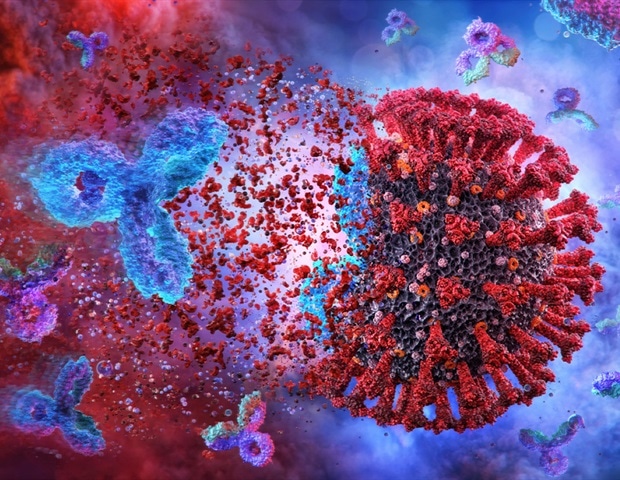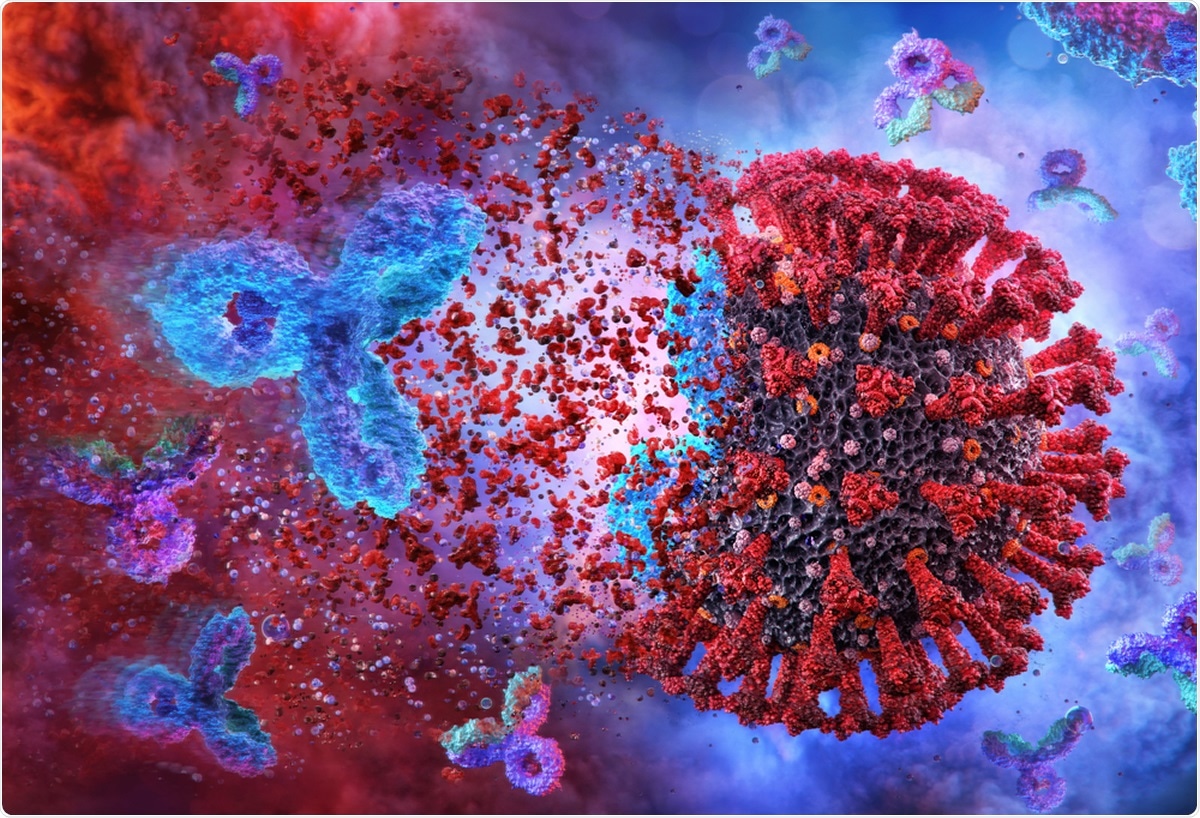Health
Investigation of SARS-CoV-2 antibody response in patients with invasive hematological malignancies

Patients with hematological malignancies (PHM), also infected with COVID-19, were investigated for SARS-CoV-2 antibody response while receiving systemic anticancer therapy. Although there is no clear correlation between serological results and hematological diagnosis and treatment, the immune response is similar to the severity of COVID-19 infection observed in the general population.
According to the WHO report, the current pandemic of COVID-19 (Coronavirus Disease 2019) has resulted in more than 35 million COVID-19-positive cases and more than 1 million deaths. COVID-19 is caused by a new coronavirus strain, SARS-CoV-2 (Severe Acute Respiratory Syndrome Coronavirus 2). Understanding the immune response caused by SARS-CoV-2 in patients is essential to developing effective preventative measures, successful treatments, and increased recovery rates. Immune responses can vary significantly, as observed in the presence of comorbidities.
Underlying diseases such as cancer are high risk factors during COVID-19 infection. Cancer patients can have serious complications due to malignant tumors, specific immune responses, and treatment-related problems.In a new study published in medRxiv*, Jenny Onions et al. At University College London Hospital, we will investigate the SARS-CoV-2 antibody response in a cohort of patients with both aggressive hematological malignancies and COVID-19.
Patients with hematological malignancies (PHMs) make up only 10% of all cancers. However, their treatment management in the face of a pandemic is complicated. PHM has been reported to have serious consequences during COVID-19 infection. High mortality rates have also been observed and standard treatments need to be changed. Most of the prevalence, clinical course, and outcome of COVID-19 in PHM are not yet fully established.
Several recommendations have been made for standard treatments for PHM to address and mitigate COVID-19 infection. Research on the immune response to SARS-CoV-2 in PHM is underway for this effort. However, the serum prevalence, magnitude, kinetics, and functionality of antibody responses in PHM are unknown. In this study, sera from aggressive hematological malignancies and 10 patients with COVID-19 were collected between April and May 2020 and tested for antibodies to viral antigens.
All patients received SACT (systemic anticancer therapy) within 28 days of developing COVID-19 infection. COVID-19 symptoms in these patients were mild to severe, two of whom required an ITU (intensive care unit) and mechanical ventilation. After treatment, all patients were discharged within approximately 22.5 days of illness. All patients, except one, were tested positive for SARS-CoV-2 RNA by the PCR (polymerase chain reaction) method.
Serum samples were screened for anti-SARS-CoV-2 antibodies against external spiked (S) and nuclear protein (N) antigens. Two patients were seronegative. Total serum IgG was also normal in all cases, confirming that the decrease or deficiency of SARS-CoV-2 IgG was not due to hypogammaglobulinemia (indicating a disorder of the immune system). The authors show that PHM can produce antibodies against the SARS-CoV-2 antigen. This is similar to other COVID-19 patients without hematological malignancies.
The authors also compared the temporal dynamics of SARS-CoV-2 antibody reaction. Seroconversion to both antigens (S and N) was similar to that reported in patients without hematological malignancies, but with a slight delay.
In addition, to test the functional activity of SARS-CoV-2 specific antibodies-to inhibit SARS-CoV-2 infection and to neutralize the virus-researchers evaluated the neutralizing activity (“In vitro) Of serum from the patient. As expected, seronegative patients showed no neutralizing activity. However, 6 out of 8 serum-positive patient samples have suppressed viral infection. The two patients who showed no neutralizing activity had very low anti-S1 IgG levels, which were almost unquantifiable. S1 is the domain of the SARS-CoV-2 spike antigen protein. However, it is interesting to note that the other two patients successfully neutralized the infection despite low anti-S1 IgG levels.Studies explain the cause of this unique observation in patients: (i) produce a relatively high proportion of S1-specific IgG with neutralizing ability, and (ii) the titer of a particularly potent anti-S1 IgG. Was lowered and (iii) generated Neutralizing antibody Directed against other viral epitopes, or (iv) they produced non-IgG neutralizing antibodies.
The authors also state that patients with the strongest anti-S1 IgG and neutralization response were generally the most severe. This is not absolute, but they point out. In this study, the authors report the first longitudinal study of serological response to SARS-CoV-2 in adult patients undergoing SACT for aggressive hematological malignancies. The magnitude of the antibody response observed generally correlates with the severity of COVID-19, as reported in the general population. These observations needed to be studied in a larger patient cohort to draw conclusions and modify the approach to such cases.
They conclude that there is no clear correlation between serological response and hematological diagnosis, type, or intensity of SACT. However, seroconversion times are consistently longer in PHM. This study highlights the complexity of establishing the causes of the different reactions observed and the need for a better understanding of the quality of antibody responses in PHM with different diagnostics and treatments.
*Important Notices
medRxiv publishes unpeer-reviewed preliminary scientific reports and should not be considered definitive, guide clinical / health-related behaviors, or be treated as established information.
reference:
Journal reference:
- SARS-CoV-2 antibody response in patients with aggressive hematological malignancies, Jenny Onions, Luke Muir, Ziesin Chen, Chloe Reese Spear, Anachiara Rosa, Christopher Earl, Peter Cherepanov, Rajiv Gupta , Asim Kwaja, Claire Jolly, Laura E. McCoy, medRxiv 2020.09.29.20202846; Doi: https://doi.org/10.1101/2020.09.29.20202846
..
What Are The Main Benefits Of Comparing Car Insurance Quotes Online
LOS ANGELES, CA / ACCESSWIRE / June 24, 2020, / Compare-autoinsurance.Org has launched a new blog post that presents the main benefits of comparing multiple car insurance quotes. For more info and free online quotes, please visit https://compare-autoinsurance.Org/the-advantages-of-comparing-prices-with-car-insurance-quotes-online/ The modern society has numerous technological advantages. One important advantage is the speed at which information is sent and received. With the help of the internet, the shopping habits of many persons have drastically changed. The car insurance industry hasn't remained untouched by these changes. On the internet, drivers can compare insurance prices and find out which sellers have the best offers. View photos The advantages of comparing online car insurance quotes are the following: Online quotes can be obtained from anywhere and at any time. Unlike physical insurance agencies, websites don't have a specific schedule and they are available at any time. Drivers that have busy working schedules, can compare quotes from anywhere and at any time, even at midnight. Multiple choices. Almost all insurance providers, no matter if they are well-known brands or just local insurers, have an online presence. Online quotes will allow policyholders the chance to discover multiple insurance companies and check their prices. Drivers are no longer required to get quotes from just a few known insurance companies. Also, local and regional insurers can provide lower insurance rates for the same services. Accurate insurance estimates. Online quotes can only be accurate if the customers provide accurate and real info about their car models and driving history. Lying about past driving incidents can make the price estimates to be lower, but when dealing with an insurance company lying to them is useless. Usually, insurance companies will do research about a potential customer before granting him coverage. Online quotes can be sorted easily. Although drivers are recommended to not choose a policy just based on its price, drivers can easily sort quotes by insurance price. Using brokerage websites will allow drivers to get quotes from multiple insurers, thus making the comparison faster and easier. For additional info, money-saving tips, and free car insurance quotes, visit https://compare-autoinsurance.Org/ Compare-autoinsurance.Org is an online provider of life, home, health, and auto insurance quotes. This website is unique because it does not simply stick to one kind of insurance provider, but brings the clients the best deals from many different online insurance carriers. In this way, clients have access to offers from multiple carriers all in one place: this website. On this site, customers have access to quotes for insurance plans from various agencies, such as local or nationwide agencies, brand names insurance companies, etc. "Online quotes can easily help drivers obtain better car insurance deals. All they have to do is to complete an online form with accurate and real info, then compare prices", said Russell Rabichev, Marketing Director of Internet Marketing Company. CONTACT: Company Name: Internet Marketing CompanyPerson for contact Name: Gurgu CPhone Number: (818) 359-3898Email: [email protected]: https://compare-autoinsurance.Org/ SOURCE: Compare-autoinsurance.Org View source version on accesswire.Com:https://www.Accesswire.Com/595055/What-Are-The-Main-Benefits-Of-Comparing-Car-Insurance-Quotes-Online View photos
Pictures Credit
to request, modification Contact us at Here or [email protected]




